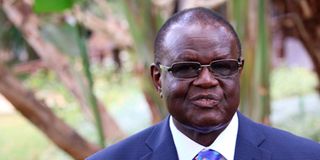Premium
Kiraitu’s musings and why Kenya’s elite don’t like strong parties

Meru Governor Kiraitu Murungi.
What you need to know:
- At both levels of government, party discipline is low or non-existent, a clear indicator that the parties are weak.
- Another indicator of weak parties is the idea of “universal suffrage” party elections – where party leaders are picked by all party members.
In the run-up to next year’s elections, parties are rebranding. And I should know. Having been independently elected in 2017, I have my antennae out as I consider whether to remain independent or whether there is any party whose ideology is close to mine. As I scan the environment, a vexing question recurs. Why does it seem like the political elite prefer weak parties?
Perhaps a good starting point is Meru Governor Kiraitu Murungi’s recent assertion that his beloved Jubilee is dead. And further that it follows in the history of PNU and Narc before it. That these parties are loose coalitions whose sole purpose is the delivery of a presidential election and then they die.
This seems rather odd, considering that he, and his political age-set, were famously referred to as Young Turks and rose to prominence agitating for the return of multi-partism.
What explains the fact that these proponents of multi-partism seem unable to build credible, ideology-based political parties?
Between 1992 and now, we have had quite a few: Ford, Ford-Kenya, Ford-People, Ford-Asili, Kanu, Social Democratic Party (SDP), Kenya National Congress, Kenda, Democratic Party (DP), National Alliance of Kenya (Nak), National Rainbow Coalition (Narc), Party of National Unity (PNU), Orange Democratic Movement (ODM), ODM-Kenya and so on.
We have had TNA, Jubilee, United Democratic Alliance (UDA), ANC and UDF.
Two-party systems
By some accounts, the registrar of political parties has received more than 1,000 applications since 2007. Of these, 73 are fully registered (May 2021) and a few more are under consideration.
Why so many weak parties?
Conventional political science has it that nations with a fixed number of single-member constituencies tend to produce two-party systems, while those with proportional representation tend to have many parties.
Kenya defies that convention.
At both levels of government, party discipline is low or non-existent, a clear indicator that the parties are weak.
Another indicator of weak parties is the idea of “universal suffrage” party elections – where party leaders are picked by all party members.
Catchy slogans
Although sold as “more democratic”, it significantly dilutes any possibility of ideology. Why? Because to appeal to most members is to seek to offer something for everyone.
The visions and manifestos of all leading parties sound and look the same.
For instance, UDA is talking bottom-up economics without elaborating.
ODM is talking about supporting rural growth, again without much elaboration.
We already know that we have jobless growth in Kenya. That is, the gross domestic product is increasing without a commensurate increase in jobs. What does either party propose to do beyond the catchy slogans?
Kenyan political parties are weak because that weakness helps the political elite as they circulate and jump from one camp to another.
Ndiritu Muriithi is the Governor of Laikipia County. His twitter handle is @NdirituMuriithi





